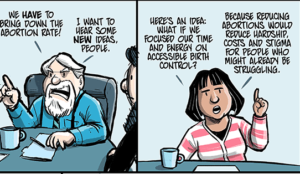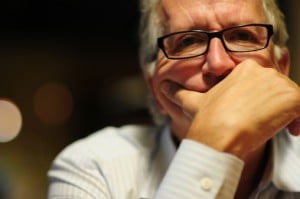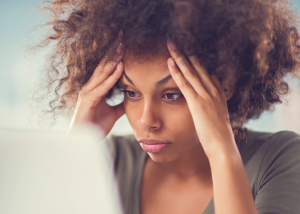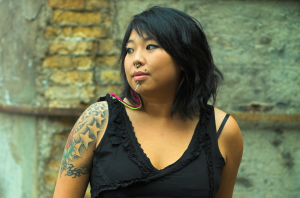Originally published on The Establishment and republished here with their permission.

Two people hugging and smiling outdoors.
“It must be so frustrating for your kids for you to be always right.”
This Facebook comment made me chuckle. Yes, like all kids, they hate having parents who are “always” right. But what really made me laugh is that they, more than anybody else, get to see me be wrong all the time.
With kids, it’s easy to let your guard down, to throw out untested ideas as facts, to default to the old standby “because I said so.” And because of this, they see me be wrong a lot.
But because I’m committed to being wrong the right way, they also see me admit it. They’ve seen me be wrong in the answers I give them to everyday questions. They’ve seen me be wrong in how I respond to stressful situations. They’ve seen me be inconsistent and hypocritical. They’ve seen me lie and obfuscate.
But when it’s apparent that I’ve been wrong, they see me acknowledge my wrongness, sit in it a minute, and then grow. I’ve put a lot of time and effort into learning how to be wrong – and I’m not perfect with it. But the skills I’ve acquired and continue to grow help me become a better person every day.
We are all wrong about a lot of things a lot of the time. All of us.
We can be wrong because we didn’t consider all the facts. We can be wrong because we misinterpreted a situation. We can be wrong on purpose or on accident. We can be wrong because we were told something that was untrue and we believed it – be it about culture, history, statistics, or anything else. We can be wrong because the definition of what is right has changed (for example, with language that we use that was once deemed appropriate, and is no longer).
But first, we have to be wrong the right way. If you want this for yourself – if you want to replace a life filled with the insecurity, anger, and hubris required in “never being wrong” with the knowledge, empathy, and growth inherent in being wrong the right way – try these suggestions.
1. Pause – Take a Deep Breath
Has someone suggested that you might be wrong? Does that have your blood pressure rising? You need to take a minute.
Defensiveness is natural. Any time we state a position or what we know to be a fact – any time we are speaking out – we’re taking a risk. When we speak definitively, even about small things, we’re putting a bit of our credibility on the table.
So yes, when that credibility is called into question, we’re going to react.
But you’re going to have to take a minute and breathe through that reaction before you find yourself doubling down and committing to never being wrong.
2. Check Yourself – Are You Really as Sure as You Seem?
Sometimes the confidence required to make a strong argument leads us to believe that we are more secure in our statements than we actually are.
Sometimes, I’ll state vague memories as fact, when at best, I’m 70% sure that I’m remembering things accurately. So after you’ve caught your breath, pause and consider: Is there a chance I don’t have my facts straight? If so, check your facts before you continue.
This doesn’t mean that you have to enter into every challenge to debate on the Internet, and it doesn’t mean that you should never feel confident in your statements.
It simply means that you should always be willing to do a quick internal scan of your statements and actions against what you truly know.
3. Is There Room for More Than One Truth Here?
I am known for refusing online debates – not because I feel that I’m always right, but because I refuse to reduce right and wrong about important social issues to sport, and because I refuse to ignore all the other ways in which things can be right and wrong outside of verifiable facts.
Very little in life is in black and white, and when we’re discussing social issues, there’s often more than one truth. This is even more true when we’re discussing emotions or the emotional impact of ideas and actions.
Your experience can be completely opposite of somebody else’s experience, and they can both be 100% right.
But understand, if you are posing your experience as the only experience or the only right experience – you are 100% wrong.
4. What Are You Hoping to Get Out of This?
When you find yourself in a situation where you’re confronted with the possibility of being wrong, decide what you want to get out of this situation: Do you want to be right, or do you want to be better? Do you want this conversation to end with “I’m wrong, you’re right, I’m sorry, I won’t question you again?” Or do you want it to end with you being more knowledgeable, more empathetic, more useful, more kind?
5. Don’t Try to Immediately Point Out How Somebody Else Is Also Wrong
Life is not a game show. When we’re wrong, we owe it to the entire experience to just be wrong for a bit. Own it, sit with it, feel shitty for a second, and then focus on learning how to be less wrong.
If you really care about the subject you’re talking about, or even if you just really care about being wrong the right way, you’ll give this process the attention it deserves, instead of trying to immediately deflect attention and criticism onto somebody else.
6. When You’re Wrong, Own It
I was wrong. It’s often that easy.
You don’t have to eat shit every time you are wrong about something. Sometimes you are wrong about simple things (I was convinced that narwhals aren’t real animals until my son reminded me that Google exists), and it’s good to get used to saying “Heh, I was wrong about that” without getting your ego in a bunch.
Whenever you’re wrong, admit it, and admit it as publicly as you were willing to insist you were right.
7. If You’ve Done Harm, Apologize
Sometimes you’re wrong and nobody is hurt (see narwhals above); sometimes you are wrong and somebody is hurt.
You can be wrong in a way that denies someone’s identity or experience. You can use language that hurts people. You can support a lie that has real consequences for real people. You can support actions or ideas that hurt people you never considered.
If you have caused harm to somebody else, just say sorry. This can be the hardest part, because often we hate the thought of being “bad” more than being “wrong” and we like to pretend that all our mistakes, if we make them, are harmless – but we are human and humans hurt other humans.
We all have words we’d like to take back, votes we’d like to change, actions we’d like to undo. We try our best not to hurt each other, and sometimes we fail. But denying the hurt caused other people will only compound that pain.
You can be wrong and learn, or you can stay wrong and then be wrong about how wrong you are.
8. Recognize That Knowing You’re Wrong Is Far Better Than Not Knowing You’re Wrong
If I have toilet paper hanging out the back of my skirt, I really hope someone will take the time to tell me.
Yes, I’ll be embarrassed as hell, but if I get to the end of a busy day and discover it myself, I’m going to be mortified and hurt that y’all let me parade around making an ass of myself in front of the entire world.
The same goes for being wrong.
I hate being wrong as much as anybody else, but my greatest fear is that I’ll continue to be wrong and everyone will see it and nobody will bring it to my attention.
As much as the initial embarrassment of realizing you were wrong sucks, be grateful that you now have the chance to throw that toilet paper away.
***
So there you have it – my tips for learning how to be wrong the right way. This isn’t an exhaustive list, and hell, I might be wrong, but it’s served me well over the years.
Get out there and live with the type of bravery you can only have when you are willing to admit to mistakes and learn from them. Be wrong, and be good at it.
More from The Establishment:
- When I Said All Trump Supporters Are White Supremacists, I Meant It
- Inside Stanford’s New Victim Blaming Alcohol Policy
- My Friends Would Rather Have Their Guts Cut Open Than Be Like Me
[do_widget id=’text-101′]
Ijeoma Oluo is the Editor-at-Large of The Establishment. A Seattle-based writer, speaker, and Internet yeller, her work has appeared in The Guardian, The Stranger, New York Magazine, Huffington Post, and more. She was named one of the Most Influential People in Seattle by Seattle Magazine. She’s also a columnist at The Seattle Globalist.
Search our 3000+ articles!
Read our articles about:
Our online racial justice training
Used by hundreds of universities, non-profits, and businesses.
Click to learn more




















